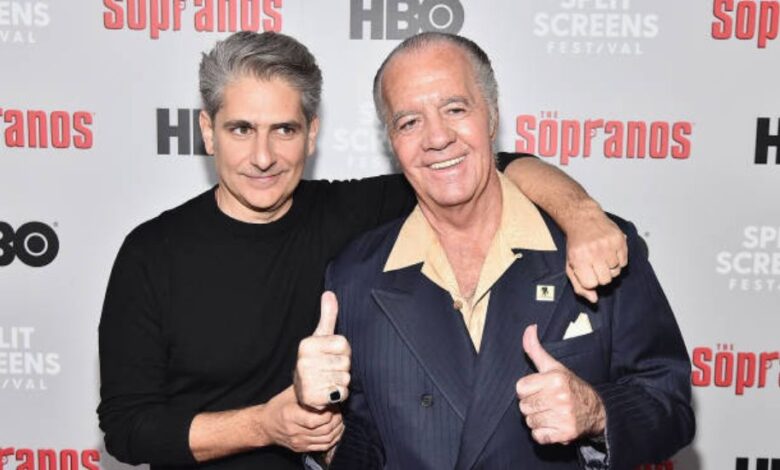
Introduction
Few television characters have had the cultural impact of Tony Soprano. Known as the troubled yet commanding mob boss from HBO’s groundbreaking drama The Sopranos, Tony became the face of the modern “antihero” in television storytelling. Played by James Gandolfini, Tony Soprano combined ruthless power with surprising vulnerability, giving audiences a mobster who was equal parts intimidating and relatable. This article dives deep into who Tony Soprano is, his background, age, fictional net worth, real-life inspirations, family, and appearances in movies and TV shows — all while highlighting the lasting influence of this unforgettable character.
Who is Tony Soprano?
Tony Soprano, full name Anthony John “Tony” Soprano, Sr., is a fictional character created by David Chase for the HBO series The Sopranos (1999–2007). Set in New Jersey, the series explores Tony’s dual life: balancing his duties as head of the DiMeo crime family with his responsibilities as a husband and father. The show’s brilliance lies in presenting Tony not only as a crime boss but also as a man struggling with anxiety, therapy sessions, and family conflicts.
Tony Soprano is often portrayed as a man caught between tradition and modernity. He tries to preserve his family’s criminal empire in an era where old mafia values are fading, while simultaneously facing the realities of suburban life, parenting, and the American dream. This complexity helped redefine television characters, inspiring later antiheroes like Walter White (Breaking Bad) and Don Draper (Mad Men).
Tony Soprano’s Age and Background
In the series, Tony’s birth date is given as August 22, 1959, which makes him around 40 years old when The Sopranos begins in 1999. Over the show’s six seasons, he ages into his late 40s by the finale in 2007.
Tony grows up in Newark, New Jersey, the son of mobster Johnny Soprano and Livia Soprano. His early life is heavily influenced by the mafia world, and he is shown in flashbacks as a teenager drawn into criminal life. In the 2021 prequel film The Many Saints of Newark, audiences see Tony as a boy navigating adolescence during the 1960s. Played by Michael Gandolfini (James Gandolfini’s real-life son), young Tony is depicted as a sensitive but impressionable kid who idolizes his uncle Dickie Moltisanti — further grounding his eventual rise to mafia leadership.
Tony Soprano’s Net Worth
While Tony Soprano is fictional, fans and analysts often estimate his net worth based on his businesses, rackets, and visible wealth in the series. Estimates vary widely:
- Some sources place his net worth at around $30 million, considering his real estate holdings, front businesses like the Bada Bing strip club, and his cut from mafia operations.
- Others suggest it could be closer to $50–60 million, factoring in his extensive illegal operations, gambling profits, and hidden cash reserves.
Though never officially quantified in the show, it is clear Tony enjoys an upper-class lifestyle: a large mansion in New Jersey, luxury cars, expensive vacations, and access to significant liquid assets. His fictional wealth symbolizes the power and corruption of the mafia world while also contrasting with his constant paranoia and fear of losing it all.
Movies and TV Shows with Tony Soprano
The Sopranos (1999–2007)
Tony Soprano’s defining role is, of course, in The Sopranos. Over six critically acclaimed seasons, the show became one of HBO’s flagship series and is often credited with ushering in the “golden age of television.” Tony’s therapy sessions with Dr. Jennifer Melfi (played by Lorraine Bracco) are some of the most iconic scenes in TV history, blending crime drama with deep psychological exploration.
The Many Saints of Newark (2021)
In the prequel film The Many Saints of Newark, Tony appears as a younger version of himself. Played by Michael Gandolfini, the movie shows Tony as a teenager in the late 1960s, growing up in Newark amid racial tensions, gang violence, and family crime operations. This film deepens the audience’s understanding of Tony’s origins and his eventual path toward becoming a mob boss.
Tony Soprano in Real Life
Though fictional, Tony Soprano was inspired by several real-life mobsters. The most notable inspiration is Vincent “Vinny Ocean” Palermo, a New Jersey mobster who became a government informant. Like Tony, Palermo was a family man who secretly ran a powerful crime family.
Other influences included Richie “The Boot” Boiardo, a Newark mobster whose flamboyant lifestyle and violent reputation reflected elements of Tony’s world. Creator David Chase drew upon stories from New Jersey’s real mafia families, particularly the DeCavalcante crime family, which bore striking similarities to the Soprano clan.
However, it was James Gandolfini’s performance that brought Tony to life. Gandolfini’s mix of menace and tenderness made audiences believe in the reality of Tony Soprano, cementing him as one of the greatest television characters of all time.
Tony Soprano’s Marriage and Relationships
Tony is married to Carmela Soprano (played by Edie Falco), his high school sweetheart. Their marriage is a central element of the series, filled with love, resentment, betrayal, and frequent conflicts over Tony’s criminal lifestyle and infidelities.
Carmela, though frustrated with Tony’s affairs, benefits from his wealth and struggles with her own moral contradictions. This dynamic showcases the theme of complicity in corruption: Carmela often condemns Tony’s choices but enjoys the privileges they provide.
Tony’s affairs are numerous throughout the series, involving characters like Irina Peltsin, Gloria Trillo, and Valentina La Paz. These affairs add layers of conflict to his marriage and underline his inability to find emotional stability outside his marriage.
Tony Soprano’s Kids
Tony and Carmela have two children:
- Meadow Soprano – Their daughter, Meadow, is intelligent, ambitious, and initially resentful of her father’s criminal activities. Over time, she struggles to reconcile her privileged lifestyle with her father’s dark world.
- Anthony “A.J.” Soprano Jr. – Their son, A.J., is often portrayed as immature and directionless. Tony wants A.J. to succeed outside the crime world but is frequently disappointed by his lack of ambition.
The family dynamics between Tony, Carmela, Meadow, and A.J. provide much of the emotional heart of The Sopranos. Beyond the mob plots, the series constantly explores Tony’s role as a father and husband, grounding the show in relatable family drama.
The Psychological Side of Tony Soprano
What made Tony unique was not only his role as a mob boss but also his willingness to confront his mental health struggles. Early in the series, Tony begins therapy with Dr. Melfi after experiencing panic attacks. This storyline was groundbreaking, showing a traditionally masculine, violent mobster as someone dealing with vulnerability, trauma, and psychological conflict.
These therapy sessions humanized Tony, making him relatable despite his brutal lifestyle. They also provided a lens into the psychology of criminals, exploring themes of guilt, repression, maternal influence, and the search for meaning.
Cultural Impact and Legacy
Tony Soprano became the prototype for the modern TV antihero. Before Tony, mob bosses were mostly portrayed in film — like Vito and Michael Corleone in The Godfather. But The Sopranos brought this archetype into the weekly rhythm of television, allowing for deeper exploration of character development.
The show won multiple Emmy Awards and is still considered one of the greatest TV series ever made. Tony’s character inspired countless other shows that centered on morally gray protagonists, including Breaking Bad, Boardwalk Empire, and Sons of Anarchy.
Even years after the finale, debates rage on about Tony’s ultimate fate in the show’s infamous final scene — a cut-to-black moment that leaves his ending ambiguous.
Conclusion
Tony Soprano remains one of the most enduring characters in modern television history. From his estimated wealth and mafia empire to his family struggles and therapy sessions, he embodies the contradictions of power, morality, and humanity. Audiences saw in Tony both the brutality of organized crime and the vulnerability of a man trapped by his own life choices.
Through The Sopranos and The Many Saints of Newark, Tony’s story continues to captivate fans, solidifying his place in pop culture. Whether analyzed for his fictional net worth, his age, or his family drama, Tony Soprano’s legacy extends far beyond the small screen — into the very DNA of television storytelling.
And as we reflect on Tony Soprano’s life and legend, it’s clear that his impact is timeless. For more deep dives into iconic figures, visit newslyblogs — your source for detailed cultural and entertainment insights.



